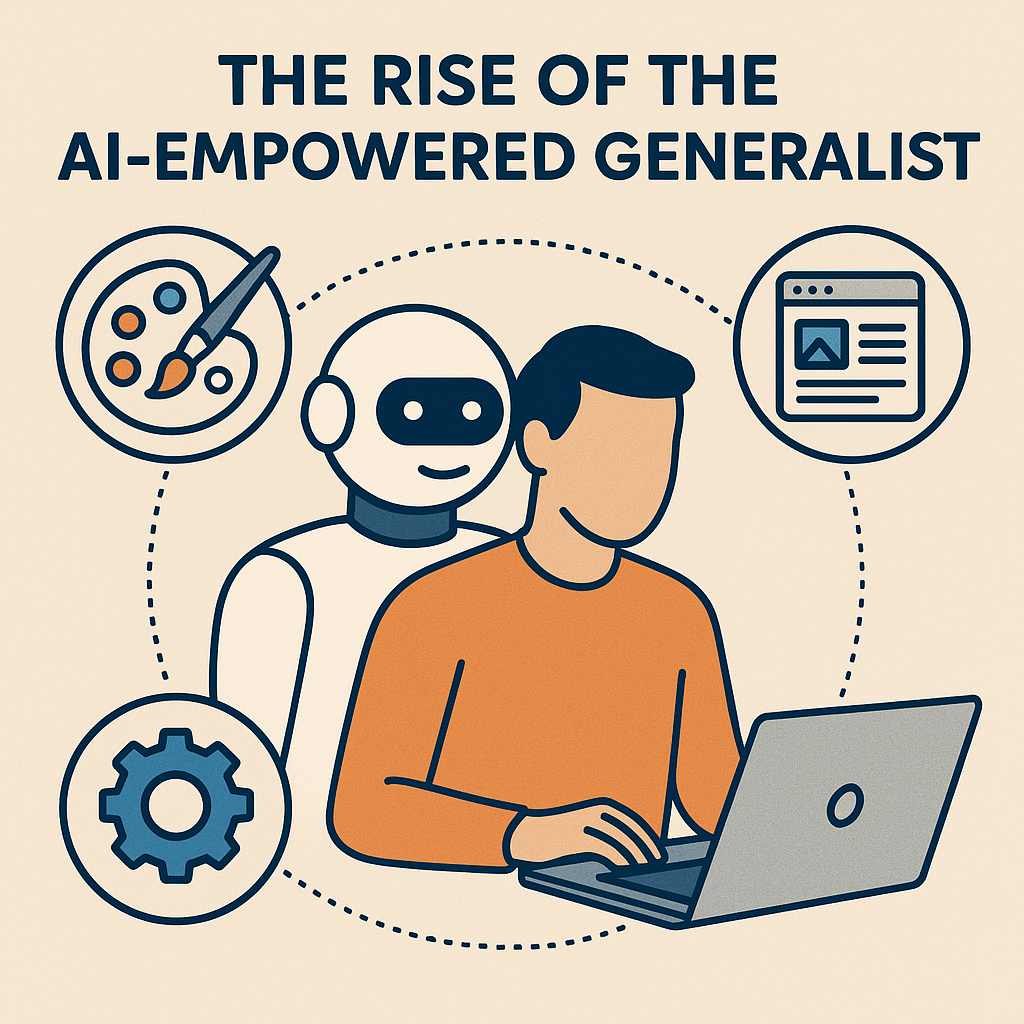🤖 The rise of the AI-empowered generalist
Introduction
I've been thinking about generative AI a lot lately. The way it's reshaping what's possible for individuals working on projects got me wondering about the future of specialized roles versus generalists.
There's this common narrative that AI tools just make specialists better or more efficient at their specialized jobs - helping marketers create better marketing, designers create better designs, and developers write better code. But I think there's something much more interesting happening.

The AI-powered generalist advantage
Breaking down traditional skill barriers
For the longest time, we've organized our work and careers around specialized disciplines. You're either a designer or a developer. A marketer or a product manager. A copywriter or a UX researcher.
These divisions made sense in a world where mastering each discipline required years of dedicated practice and the cognitive overhead of context-switching between disciplines was high.
But generative AI is fundamentally changing this equation.
A marketer who needs to prototype a landing page no longer needs to wait for design and development resources to become available. They can:
- Describe what they want to a text-to-image model
- Generate the HTML/CSS with a code-generation model
- Write compelling copy with a language model
- Test different variants with relatively minimal effort
Similarly, a developer who previously might have outsourced design work can now:
- Generate UI mockups through prompting
- Get colour palettes and typography suggestions
- Convert mockups to working code with minimal friction
- Iterate quickly without dependency on a design team
The emergence of the AI-augmented polymath
What we're seeing isn't just specialists using AI to do their specialized jobs better or faster (though that's happening too). We're witnessing the rise of the AI-augmented polymath - people who can competently handle multiple aspects of a project by leveraging AI to fill in their knowledge gaps.
This doesn't mean everyone will suddenly become expert at everything. Rather, it means the threshold for "good enough" in adjacent disciplines is becoming much more accessible.
Why having only one specialty might limit you
The narrowing valley of specialization
In the pre-AI world, specialists had a clear advantage: deep expertise that generalists couldn't match. But AI is rapidly narrowing this advantage in many domains.
Consider these scenarios:
- A specialized copywriter might write better copy than a generalist + AI… for now. But as models improve, that gap shrinks.
- A specialized front-end developer might code more efficiently than a designer using AI assistance… for now. But that gap too is narrowing.
- A specialized graphic designer might create more original work than a marketer using image generation… for now. But with each model iteration, the difference becomes less obvious.
The compounding advantage of cross-domain fluency
Meanwhile, the generalist who understands multiple domains has a different kind of advantage - one that AI actually amplifies rather than diminishes: cross-domain fluency.
They can:
- Spot connections between disciplines that specialists might miss
- Maintain coherence across all aspects of a project
- Make informed trade-offs without complex coordination
- Iterate holistically rather than sequentially
This is why the "jack-of-all-trades, master of none" stigma is rapidly becoming outdated. In an AI-augmented world, being reasonably competent across multiple domains while using AI to fill skill gaps might actually be more valuable than being exceptionally skilled in just one area.
Project autonomy and the solo creator
From team dependency to self-sufficiency
Perhaps the most radical shift is how generative AI enables project autonomy. It's becoming increasingly feasible to run substantial projects from conception to completion as a single person.
Before generative AI, a typical product launch might require:
- A product manager to define requirements
- A UX researcher to understand user needs
- A designer to create the visual identity and interface
- A copywriter to craft the messaging
- A developer to build the actual product
- A marketer to promote the launch
- A data analyst to measure results
Now, a competent generalist with AI assistance can reasonably handle all these roles at a baseline level of quality that would have been impossible for a solo creator just a few years ago.
The indie renaissance
This is leading to what might be called an "indie renaissance" across multiple industries:
- Solo developers launching products that previously would have required teams
- Individual creators producing media at studio quality levels
- Small businesses competing with larger organizations on content production
- Freelancers offering full-service solutions instead of specialized services
The acceleration curve
Models are getting better at an astonishing pace
What makes this shift particularly significant is the pace of improvement in generative AI capabilities.
The gap between what a specialist can produce and what a generalist with AI assistance can produce is shrinking with each model iteration. And these iterations are happening at an unprecedented pace.
What seems like a modest advantage for the AI-augmented generalist today will likely be a substantial advantage within a year, and potentially a decisive advantage within three years.
The future belongs to the adaptable
As models improve, the value proposition of being a "pure specialist" in many fields will continue to erode, while the value of being adaptable, intellectually curious, and comfortable working across domains will increase.
The future increasingly belongs to those who can:
- Rapidly learn enough about adjacent disciplines to effectively prompt AI systems
- Synthesize insights across domains
- Know when human expertise is still essential
- Maintain a holistic vision across all aspects of a project
Conclusion
While there will always be roles for deep specialists, particularly in areas that resist AI automation, the economic and creative opportunities for generalists are expanding dramatically.
The "jack-of-all-trades, master of none" might be evolving into "jack-of-all-trades, master of AI collaboration" - and that could be the most valuable skill profile of the coming decade.
What do you think? Are you seeing this shift in your own work? Have you found yourself taking on tasks that would have been outside your domain pre-AI?